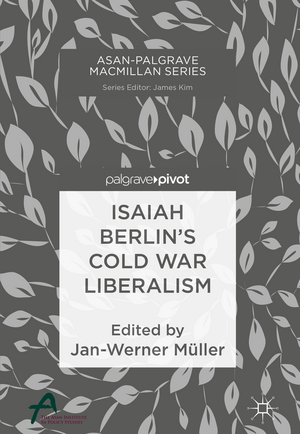Isaiah Berlin’s Cold War Liberalism: Asan-Palgrave Macmillan Series
Editat de Jan-Werner Mülleren Limba Engleză Hardback – 19 feb 2019
Preț: 481.79 lei
Nou
Puncte Express: 723
Preț estimativ în valută:
92.19€ • 96.51$ • 76.28£
92.19€ • 96.51$ • 76.28£
Carte tipărită la comandă
Livrare economică 05-19 aprilie
Preluare comenzi: 021 569.72.76
Specificații
ISBN-13: 9789811327926
ISBN-10: 9811327920
Pagini: 109
Ilustrații: VIII, 94 p. 1 illus.
Dimensiuni: 148 x 210 x 10 mm
Greutate: 0.28 kg
Ediția:1st ed. 2019
Editura: Springer Nature Singapore
Colecția Palgrave Pivot
Seria Asan-Palgrave Macmillan Series
Locul publicării:Singapore, Singapore
ISBN-10: 9811327920
Pagini: 109
Ilustrații: VIII, 94 p. 1 illus.
Dimensiuni: 148 x 210 x 10 mm
Greutate: 0.28 kg
Ediția:1st ed. 2019
Editura: Springer Nature Singapore
Colecția Palgrave Pivot
Seria Asan-Palgrave Macmillan Series
Locul publicării:Singapore, Singapore
Cuprins
1. Introduction: Concepts, Character, and the Specter of New Cold Wars.- 2.Isaiah Berlin and Reinhold Niebuhr: Cold War Liberalism as an Intellectual Ethos.- 3. The Contours of Cold War liberalism (Berlin in General).- 4. Liberal Pluralism and Common Decency.
Notă biografică
Jan-Werner Müller is a professor of politics at Princeton University, where he also directs the Project in the History of Political Thought. His previous books include What is Populism? (2016) and Contesting Democracy: Political Ideas in Twentieth-Century Europe (2011). He writes for the Guardian, the London Review of Books, and The New York Review of Books.
Textul de pe ultima copertă
"Confronting a series of caricatures of Isaiah Berlin, three insightful scholars ponder his relevance for our own time. Was Berlin’s ‘Cold War liberalism’ also an attempt at relentless criticism of liberal complacency? Far from propounding a dogmatic liberalism, did Berlin not acknowledge, alongside a ‘moral minimum,” the necessity of political compromise? Whatever the answers, this book successfully redeems Berlin for continuing engagement in a new era."
—Samuel Moyn, Yale University "As we settle into a new century of global conflict, the contours of the one just ended are snapping into focus. This volume casts fresh light on one of that century's most humanist observers: Isaiah Berlin. Through historical and philosophical exploration, the three authors here ask us to consider Berlin and his legacy anew, asking what he meant in his time, and what he might mean for us."
—James Chappel, Duke University
"A very stimulating volumethat places Berlin’s thought in the post-war context without reducing it to a mere expression of its time. The essays help us to see that it was as much Berlin's “untidy” exploration of political psychology as his principles that expressed the liberalism he cherished."
—Mark Lilla, Columbia University
This book offers a critical re-examination of Berlin’s Cold War liberalism, at a time when many observers worry about the emergence of new global, partly ideologically driven conflicts.
Jan-Werner Müller is a professor of politics at Princeton University.
—Samuel Moyn, Yale University "As we settle into a new century of global conflict, the contours of the one just ended are snapping into focus. This volume casts fresh light on one of that century's most humanist observers: Isaiah Berlin. Through historical and philosophical exploration, the three authors here ask us to consider Berlin and his legacy anew, asking what he meant in his time, and what he might mean for us."
—James Chappel, Duke University
"A very stimulating volumethat places Berlin’s thought in the post-war context without reducing it to a mere expression of its time. The essays help us to see that it was as much Berlin's “untidy” exploration of political psychology as his principles that expressed the liberalism he cherished."
—Mark Lilla, Columbia University
This book offers a critical re-examination of Berlin’s Cold War liberalism, at a time when many observers worry about the emergence of new global, partly ideologically driven conflicts.
Jan-Werner Müller is a professor of politics at Princeton University.
Caracteristici
Contextualizes Isaiah Berlin for a new age Reinterprets Berlin's liberalism for the Trump era Updates Berlin's logic for a rising Asia and current conflicts in East Asia











